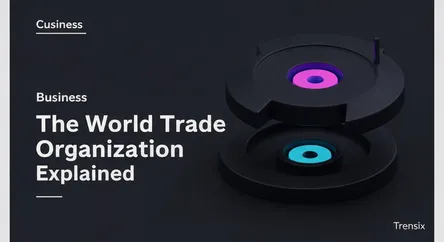Business
The World Trade Organization Explained

Discover the World Trade Organization (WTO), the global body that sets the rules for international trade and aims to resolve trade disputes.
What is it?
The World Trade Organization (WTO) is the only global international organization dealing with the rules of trade between nations. Established in 1995, it succeeded the General Agreement on Tariffs and Trade (GATT). At its core, the WTO is a forum for governments to negotiate trade agreements and settle trade disputes. Its main goal is to ensure that trade flows as smoothly, predictably, and freely as possible, operating a system of trade rules that apply to its 164 member countries, representing about 98% of world trade.
Why is it trending?
The WTO is frequently in the news due to ongoing global trade tensions, particularly between major economic powers like the United States and China. Discussions about reforming the organization, especially its appellate body for settling disputes, are a hot topic. Furthermore, global challenges like the COVID-19 pandemic's impact on supply chains, digital trade, and sustainable development have put the WTO's role and effectiveness under intense scrutiny, making its decisions and negotiations highly relevant to the current economic climate.
How does it affect people?
The WTO's policies directly impact consumers and businesses. By lowering trade barriers like tariffs, it can make imported goods cheaper and more widely available, from electronics to food. For businesses, WTO rules create a more predictable and fair environment for international trade. However, these same rules can lead to increased competition for domestic industries, potentially affecting local jobs. The agreements negotiated at the WTO also influence standards for labor, environmental protection, and intellectual property, which have far-reaching effects on everyday life.